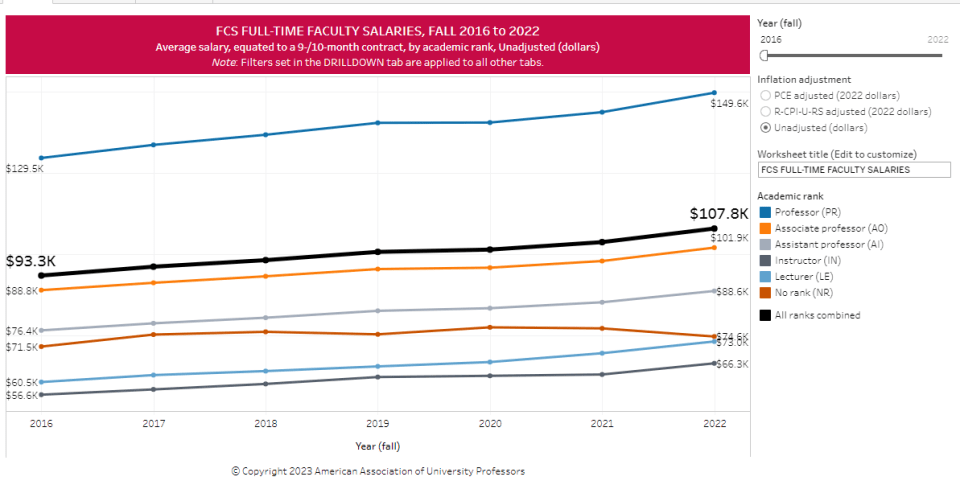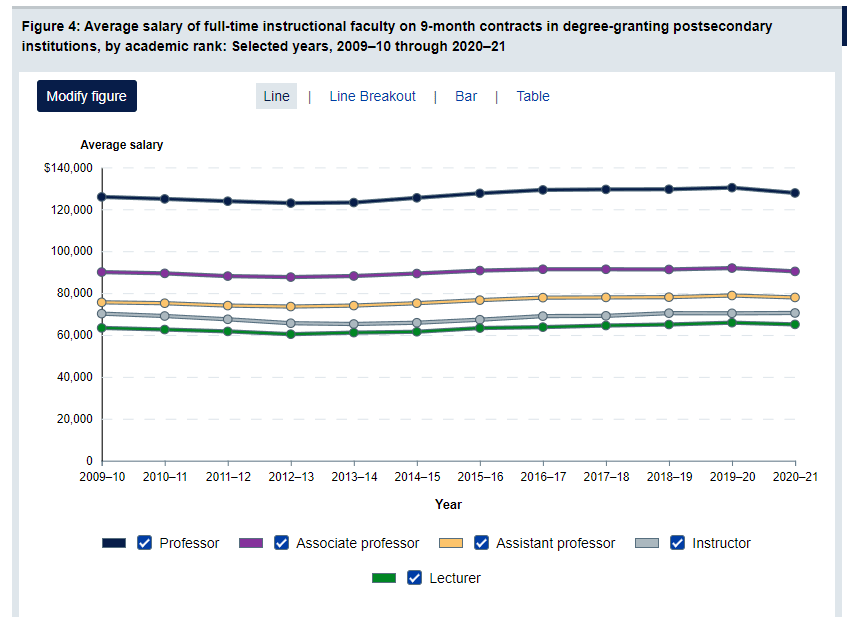Being a Professor is a (Product and Reinforcer of) Privilege
Professors love their poverty cosplay. In reality, academics are social elites. They typically hail from elite backgrounds. "Merit" in our profession largely measures antecedent advantage.
Although there’s a lot of kvetching about it in higher ed forums, working as a tenure-track professor is a pretty sweet gig. High occupational prestige. Pleasant working conditions. Summers and holidays off. Benefits ranging from admissions preference to free or heavily reduced tuition for one’s children. Extraordinary freedom, flexibility, and autonomy compared to virtually all other lines of work. Unparalleled job security. The ability to study whatever you want with little regard for practical relevance, or whether or not it actually benefits students to major in your chosen field (in fact, you’re free to be outright disdainful of those questions). And while a professor’s salary probably won’t put you in the top 1% of earners, the median professor makes almost twice as much as the typical full-time worker in the U.S.
According to AAUP estimates, the median 2022 professor salary was $107.8k.
Data from the NCES tells a similar story, estimating the 2020-2021 median postsecondary faculty salary at $91.9k.
The Bureau of Labor Statistics, meanwhile, estimated the median salary of American full-time workers in 2022 at roughly $55k (meaning professors earn 88% more than the typical full-time workers if we go with the AAUP estimates). Over the course of the 2020-2021 academic year, meanwhile, the median full-time worker earned roughly $51.4km (meaning professors earned roughly 79% more than the typical worker if we go with the NCES estimates).
Both datasets reveal that even full-time contingent faculty tend to make significantly more than the typical American full-time worker. Their situation may be miserable compared to tenure track faculty, but this is just a testament to how cushy it is to work as a tenure track professor: even the disposable scholars whose exploitation enables our relatively light workloads earn significantly more than most full-timers who hold ‘normie’ jobs (and they enjoy far better working conditions and prestige as well).
Indeed, with respect to contingent faculty it’s important to hold two truths in the mind at once: on the one hand, they can be reasonably described as “exploited” insofar as their relatively low position is what enables tenure line faculty to enjoy the lifestyles they enjoy. Contingent faculty members can make reasonable claims for more pay and stability, and a bigger role in governance. However, we must simultaneously keep in mind that most contingent faculty earn more than typical full-time workers, and even for those who earn less, this is largely as a result of choices they’re making: they would rather be an adjunct professor than to be a post office worker or a manager at Cheesecake Factory — even if they could earn more money in these latter roles.
Most normie workers making similar wages to lower-paid academics are getting the best jobs they qualify for, and earning as much as they possibly can. They are not willfully accepting jobs with lower wages and job security than plausible alternatives in order to follow their dreams and passions. But that is precisely what contingent faculty are typically doing — especially those who earn less than the median full-time worker. They’re prioritizing the ability to remain in the academy over the ability to maximize earnings and job security, and it’s important to recognize that this is a choice they’re making when they typically have many other employment options.
Part of the reason they’re making that choice is because they recognize that, in fact, it would not be better to work these “other” jobs, even if they got paid marginally more. The losses in autonomy, status, and so on are not, in their minds, worth the additional money and job security they’d get from this “other” work. Even the lower-paid contingent faculty members are not really in the “same boat” as most other workers, and recognize this on some level (it’s why folks persist in these jobs despite alternatives).
All said, it’s a privilege to work as a professor of any stripe. And for their part, professors themselves tend to hail from privileged backgrounds. They are highly unrepresentative of U.S. society writ large. This is not a coincidence. The ways we select and promote professors is basically a recipe for excluding “normies” and transforming antecedent privilege into an appearance of merit.
Measuring “Merit”
The most basic requirement to be a tenure-line professor is a terminal degree. This excludes roughly 96% of the U.S. population out of the gate, and an even higher share of Americans from poor and working-class backgrounds (who attain BAs or higher at less than half the rate of Americans from middle-income households, and one-third of the rate those from upper-income households).
However, the possession of a PhD or terminal professional degree is itself of little consequence. Where you got your credentials from is also critically important, as the brand name on the diploma is widely used as shorthand for gauging scholarly merit or potential. Across fields and nationwide, the overwhelming majority of tenured and tenure-track faculty hail from a small number of elite schools that, themselves, cater primarily to the wealthy.
Likewise, with respect to evaluating published research and writing samples, committees typically rely on where papers were published as a heuristic for evaluating quality. A paper can be highly innovative, empirically and theoretically rich, and substantively important—yet there’s a good chance that committees will never bother reading it if it’s published in a non-prestigious journal, especially if your PhD is also from a non-prestigious school. And top journals, for their part, primarily serve to enhance the positions of the already institutionally advantaged.
Editorial boards of top journals in most fields tend to be dominated by scholars from a small number of elite schools. They tend to strongly favor work by colleagues at their schools and students who graduated from their own programs in a manner inconsistent with “meritocratic” decision-making. Audit studies have found that, controlling for content, a submission to a top journal is far more likely to be accepted if submitted by a scholar affiliated with a prestigious department. In fact, many top journals have completely different (and non-rigorous) processes for evaluating the work of well-known and well-connected scholars as compared to the hoi polloi (to say nothing of the myriad other demonstrated biases associated with peer review!). Put another way, top journals in most fields primarily reward and confer prestige instead of prioritizing genuine scholarly merit.
Citations are much the same. As a recent paper in Social Science Information (SSI) powerfully illustrated, academic citations have become ludicrously gamified—and the more elite and well-connected a scholar is, the easier it is for them to game the system.
“Research productivity” likewise largely measures institutional prestige and professional connections. As a recent study in Science Advances demonstrated, scholars affiliated with elite schools tend to publish a lot more work than others. This is not because they’re working much harder. Quite the reverse. As a result of better departmental funding, scholars at top-ranked programs tend to have much lower teaching loads—and teaching assistants do most of the grading for the relatively few courses they do teach. Likewise, larger research budgets enable these scholars to outsource most tedious elements of producing papers to research assistants, further increasing their perceived productivity. The authors conclude that these labor advantages—and not differences in talent—appear to explain most of the publication productivity differences between elite scholars and everyone else. As I explored at length elsewhere, professors exploit institutional inequalities to increase their research productivity and then cite productivity differences to justify institutional inequalities.
What about grants and fellowships as meritocratic indicators? It turns out that fundraising, like peer review, is heavily informed by signaling the “correct” alignments, having the right professional networks, and being associated with high-prestige institutions (attributes that, again, tend to travel together for reasons that have little to do with merit).
All to say: “meritocratic” hiring and promotion—as typically practiced—amounts to rewarding scholars largely on the basis of their antecedent socioeconomic advantages and institutional prestige, with additional bonuses provided to scholars who parrot institutionally dominant narratives and belong to institutionally dominant groups.
Insofar as the recent Supreme Court decision on affirmative action spills over to affect hiring and promotion practices as well as college admissions, such changes are likely to exacerbate these patterns. Pressure to focus on ostensibly meritocratic indicators of one’s qualification for a position (such as the brand name of one’s degree, the prestige of the journals they’ve published in, or their citation count) will likely reinforce the privileged skew of the professoriate at the expense of scholars from less traditional academic backgrounds—all the while, reinforcing the illusion that the winners’ elite position in society is “earned.”
In truth, it’s a stretch to say any of us faculty truly “deserve” the lives we get to lead or the cultural cachet we enjoy. Serving as a tenure-track professor is a genuine privilege—one largely reserved for the already-privileged. Doubling down on “merit” (as currently measured) won’t undermine this reality. It will likely entrench it further.





